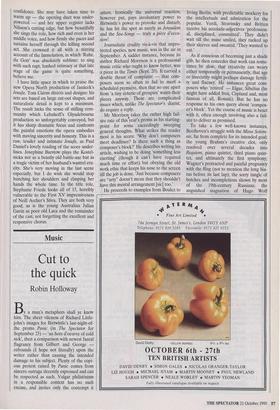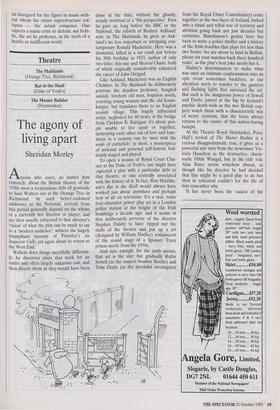Music
Cut to the quick
Robin Holloway
By a man's metaphors shall ye know him. The sheer vileness of Richard Little- john's images for Birtwistle's last-night-of- the proms Panic (in The Spectator for September 23) — 'an hors d'oeuvre of cold sick', then a comparison with newest faecal flagrancy from Gilbert and George rebounds (I hope not literally) upon the writer rather than causing the intended damage to his subject. Plenty of the copi- ous protest raised by Panic comes from sincere outrage decently expressed and can be respected as such. Vulgar philistinism in a responsible context has no such excuse, and invites only the contempt it utters. Ironically the universal reaction, however put, pays involuntary power to Birtwistle's power to provoke and disturb; he has hit the spot as surely as Jerusalem and the Sea-Songs — truly a piece d'occa- sion!
Journalistic crudity vis-a-vis that unpro- tected species, new music, was in the air in September. A sadder instance, because its author Richard Morrison is a professional music critic who ought to know better, was a piece in the Times (Sept. 20). It carried a double thrust of complaint — that com- posers seem so often to fail to meet a scheduled premiere, then that no one apart from 'a tiny coterie of groupies' wants their pieces anyway. These are complicated issues which, unlike The Spectator's diarist, do require a reply. Mr Morrison takes the rather high fail- ure rate of this year's proms as his starting- point for some exceedingly sweeping general thoughts. What strikes the reader most is his scorn: 'Why don't composers meet deadlines? Is there such a thing as composer's block?' He describes writing his article, wishing to be doing 'something less exerting' (though it can't have required much time or effort) but obeying the old work ethic that keeps his nose to the screen till the job is done. 'Just because composers are "arty" doesn't mean that they shouldn't have this mental arrangement [sic] too.'
He proceeds to examples from Boulez to Irving Berlin, with predictable mockery for the intellectuals and admiration for the popular. Verdi, Stravinsky and Britten receive his accolade-adjectives 'profession- al, disciplined, committed'. They didn't wait till the muse smiled, they tucked up their sleeves and sweated. 'They wanted to eat.'
As if conscious of becoming just a shade glib, he then concedes that work can some- times be slow, that creativity can weary either temporarily or permanently, that age or insecurity might perhaps damage fertili- ty and fluency. He instances great com- posers who 'retired' — Elgar, Sibelius (he might have added Ives, Copland and, most famous of all, Rossini). But he has no response to his own query about 'compos- er's block'. Yet the course of music is beset with it, often enough involving also a fail- ure to deliver as promised.
To take a few well-known instances, Beethoven's struggle with the Missa Solem- nis, far from complete for its intended goal; the young Brahms's creative clot, only resolved over several decades into Requiem, piano quintet, third piano quar- tet, and ultimately the first symphony; Wagner's protracted and painful pregnancy with the Ring (not to mention the long hia- tus before its last lap); the sorry tangle of botches and incompletions shown by most of the 19th-century Russians; the anguished stagnation of Hugo Wolf between delirious bouts of creative release; the long attrition of Debussy over his many unrealised projects (some of them paid for!) after Pella's; the pitiful contraction of Ravel's production after the great war; Schoenberg's inability to seize the great vision of Jacob's Ladder ; the years of baf- fled frustration undergone by Varese. The list could be endlessly extended. Closer to home, there is the famous premiere of Walton's first symphony without a finale (owing no doubt to the composer's connec- tion with those 'arty' Sitwells); and even one of the champion professionals once evinced human frailty — Britten's ballet The Prince of the Pagodas had to be thrice postponed because he'd got behind on the score.
Without claiming it as desirable, one could almost call the 'composer's block' a long and honourable tradition! Ever since the decline of patronage, with music well- understood as a functional commodity, the dangers as well as the rewards of the artis- tic temperament have been to the fore. In , extreme cases, literal-minded punctuality is out of the question. Imagine compelling Beethoven or Wagner to get a move on with that Mass or that Tetralogy, or wag- ging a finger at Brahms or Ravel for not pulling themselves together. No one could accuse them of laziness or indiscipline.
The slightest experience in the actual practice of any intellectual labour must include impediments and delays however minor. With the higher flights of creative activity moments of impasse can extend to weeks, months, years; headaches and back- aches can develop into illness both psycho- somatic and genuine; morose preoccupation can become crippling depression, suicidal despair, alienation and breakdown. There is a perpetual fear that the harvest might fail, the fountain run dry; the horror that the desert might encroach upon fertile land is never wholly absent, and sometimes overwhelmingly close. Though, of course, not everything is as black as this for much of the time, this tends to be the norm; the happy well-inte- grated worker like Richard Strauss is very much the exception.
And now, having overcome the difficul- ties to achieve the effortful goal, the wretched composer receives Mr Morrison's unkindest cut of all — no one wants the piece anyway! 'If a few composers miss a few deadlines, so what? The world is not short of music waiting to fill any awkward gaps.' And just the same fate awaits the composers who do manage to be ready on time. The first reception, be it cold or warm, is followed for the most part by an unobtrusive and unlamented disappearance — 'sunk without trace'.
If Mr Morrison could address the reason for this he might come up with something worth saying. Some bits in his article sug- gest an eye for disconcerting yet salutory truths. But its principal message, and plen- tiful cheap sideswipes, reveal a fundamen- tal disregard for the figure in music with- out whom the entire superstructure col- lapses — the actual composer. One expects a music critic to defend, not belit- tle, the art he professes, in the teeth of a hostile or indifferent world.












































































 Previous page
Previous page